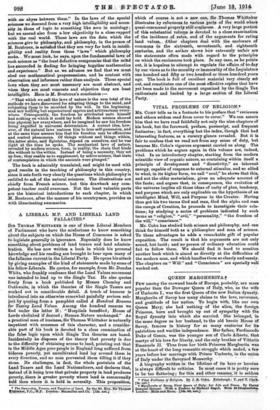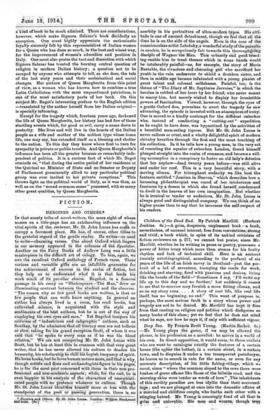QUEEN MARGHERITA.t
FEW among the crowned heads of Europe, probably, are more popular than the Dowager Queen of Italy, who, as the wife of Umberto I., was the first Queen of the new Italian dynasty. Margherita of Savoy has many claims to the love, reverence, and gratitude of her nation. To begin with, like our own Queen Mary, she bad nothing of the alien, the foreign Princess, born and brought up out of sympathy with the Royal dynasty into which she married. She belonged, in the same degree as her husband, to the old heroic House of Savoy, famous in history for so many centuries for its patriotism and warlike independence. Her father, Ferdinand° Duke of Genoa, was the younger son of Carlo Alberto, that martyr of his love for liberty, and the only brother of Vittorio Emanuele IL Thus from her birth Princess Idargherita wae at the heart of the long romantic struggle which ended, a few years before her marriage with Prince Umberto, in the union of Italy under the Savoyard Monarchy.
A biography written in the lifetime of its hero or heroine is always difficult to criticize. In most cases it is pretty sure to be too flattering; for this and other reasons, it is seldom
• Vita Problems of Religion. By J. A. Colin. Edinburgh T. and T. Cl#1a.
' [5s. net]
t Hers-soros of Sasoy, First Queen of Italy: her IAfe and Ti,,,,, By Fanny Zarapini Salarar. With a Preface by Richard Swot. With 24Hluthyns.,,, London, Mills and Boon. [1ea ed. net.) kind of book tObe much addired. There ire Cainsiderittions, however, which make Signora Salazar'a book deeidedly an exception. One must- highly Appreciate the enthusiastic giatty sit-Merely' felt by this representative of Italian women for a Queen who has done se much, in the best and wisest way, for the improvement of Women's educatien and position in Italy. One meet also prairie the tart and discretion with which Signora Salazar has treated the burning central question of religion in modern Italian history; a question not to be escaped by anyone who attempt a to tell, as she does, the tale of the last haty years and their ecclesiastical and social changes. Her picture of Queen Margherita from this point of view, as a woman who has known how to combine a true Latin Catholicism with-the most -unquestioned patriotism, is cfte Of the most satisfactory parts Of her book. On this enbject Mr. Bagot's interesting preface to the English edition —translated by the author herself from her Italian original— is specially informing: Except for the tragedy which, fourteen years ago, darkened the life of Queen Merit:melte, her history has had few Of those startling events which, for good or evil, carry a. name dovin to posterity. She lives and will live in the hearts of the Italian people as a wife and mother of the noblest type Whose home life, one May (My, has extended itself as a blessing and [dieter to the nation. To this day they know Where first to turn for sympathy in private or public trouble.' And Queen Maigherita'a influence has been all the greeter because so remarkably- hide; pendent of politics. It is a curious -fact of which Mr. Bagot reminds us, "that during the entire perrod of her residena at the Quirinal no Minister of State and no Senator or DePtity Of Parliament prominently allied to any particular political group was ever invited to her Private reoePtions." Thia throws light on the politioal wOrld of Italy, as it was then; as well as on the "sound oommon-sense " possessed, with do many other great qualities, by Queen Mire:write.











































 Previous page
Previous page